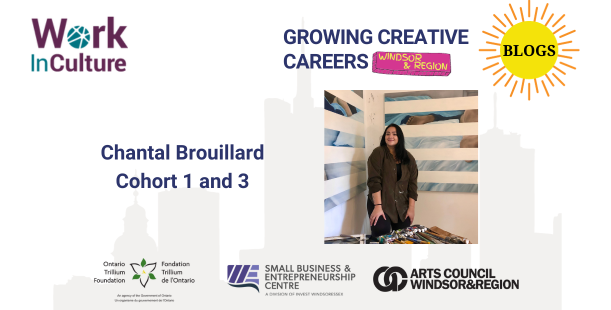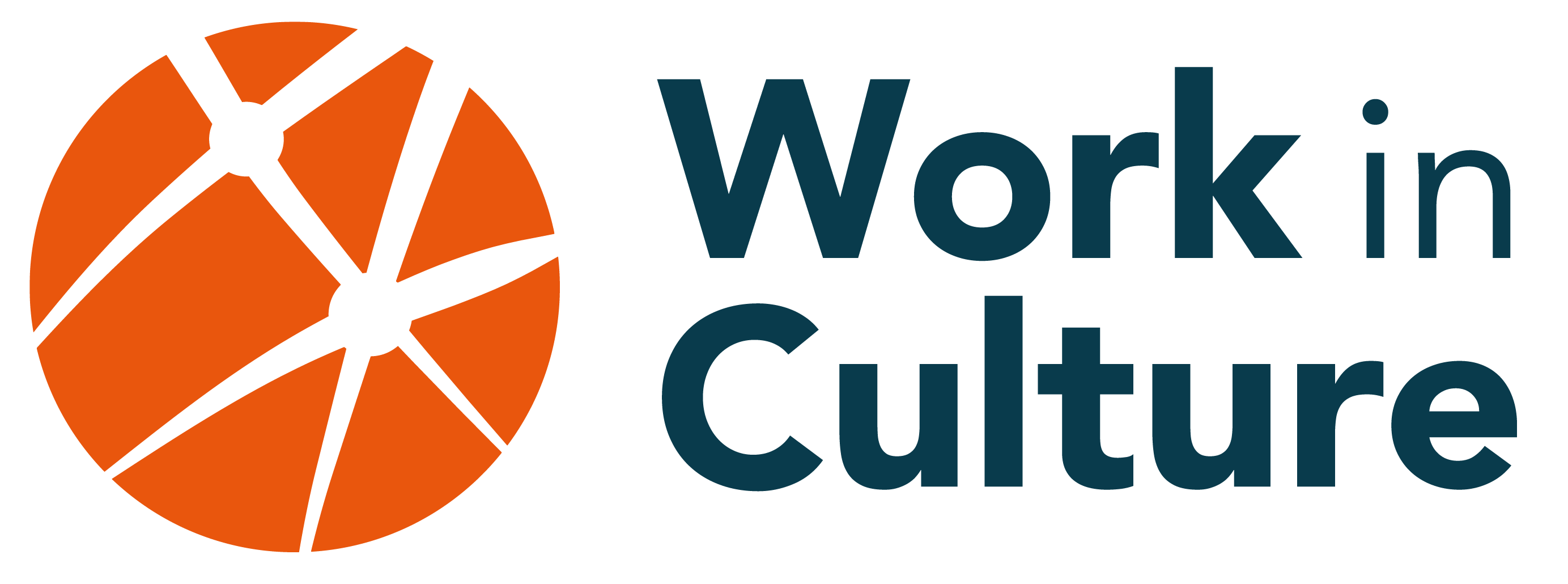
This blog is part of the Growing Creative Careers in Windsor & Region blog series. WorkInCulture worked closely with the Windsor-Essex Small Business & Entrepreneurship Centre and Arts Council Windsor & Region to develop and deliver Growing Creative Careers, a professional development training series for artists and arts workers/arts administrators in the Windsor-Essex region.
Chantal Brouillard (she/her) is an artist currently based in Windsor, Ontario. She completed her BFA in Visual Arts at the University of Windsor in 2020, focusing on painting and analog photography. Her current body of work in painting supports the concept of surveillance and private spaces. Chantal has exhibited her work throughout Windsor-Essex and in Ireland at the Burren College of Art as an artist in residence in 2022. She’s an active member of the Vanguard Youth Arts Collective and is looking forward to displaying new work in her upcoming exhibition at Arts Council Windsor & Region.
Chantal Brouillard is a participant from the first and the third cohort of our Growing Creative Careers: Windsor and Region program.
The first cohort was designed for arts professionals in the early or emerging stages of their career and covered training on articulating an arts or creative practice, CV writing, building online presence, financial management, grants and more.
The third Growing Creative Careers cohort was focused on how to build creative projects and programs, from idea to execution, for artists and arts professionals. The training series covered how to create a project plan, structure roles and responsibilities, build a contact network, create a budget and understand funding sources and grant applications.
Growing Creative Careers – Cohort 1 and 3 reflection
by Chantal Brouillard
Cohort 1 focused on administrative and business skills development for emerging and early career artists and arts professionals (e.g. developing an artist statement/professional profile, planning, networking). Based on your experience, how do these skills help artists and arts workers pursue opportunities in their field?
Throughout Cohort 1 I developed my “core documents” as a Visual Artist. Documents including artist statements, artist bios, and CVs are essential when navigating the administrative side in the early stages of my art career. Having these documents readily available when applying for grants, exhibitions and employment opportunities takes a lot off my workload and allows me to work efficiently. I am able to continuously update or modify these documents and feel more confident when applying for future opportunities. Cohort 1 allowed me to navigate as an arts professional in a low-stress approach.
Peer assessment was highly encouraged throughout the third cohort, which focused on project management. What were some of the advantages you gained by having a peer from the industry review and provide feedback for your idea?
The peer assessment was my favourite part of Cohort 3. What made it unique was the diversity of creatives in the cohort and the different stages everyone was at in their creative practice. Because I’m in the early stages of my career, the project I was working towards was essentially applying to a solo exhibition. With this in mind, the peer assessment was extremely beneficial and informative because other creatives had experience and knowledge that I didn’t regarding my project goal. The idea of seeing this project through was less intimidating. Although my practice differed from others, I was able to share some knowledge that was helpful to other cohort members and their projects. Providing feedback and information from outside sources is crucial in the development of various stages of project planning.
What were some of the benefits of being a part of 2 cohorts? Could you please elaborate on the different learnings and takeaways?
Participating in two cohorts had so many hidden benefits. For starters, I became familiar with other art disciplines and gained a better understanding of how we can all support one another in some capacity. Networking was a huge benefit of participating in two cohorts, I was able to meet many creatives from the Windsor-Essex region and potentially collaborate or seek advice from participants of various disciplines. Remaining connected even after completing the cohort and updating one another about our latest projects or achievements is the most rewarding aspect. I’m extremely grateful for the opportunity to create connections with other creatives who are rooting for your success alongside the program organizers and facilitators who are providing exceptional resources to help you along the way.
What is one major takeaway or piece of advice from the program (and/or your experience) that you’d like to share with others who are trying to advance their artistic careers/creative careers/creative projects?
There are so many takeaways from both programs I participated in, but one in particular always stuck with me/is a great piece of advice for creatives, and it’s to be resilient. Not every phase of a project will be a success, not every application or grant will get approved. Not letting the “no’s” in your career stop you from re-applying or restarting some projects. This is also important and crucial to developing a creative career. It’s easy to identify these moments as failures but it’s a better feeling to learn from each opportunity and how you are able to improve next time. Creatives need to continuously build resiliency throughout their career, not just in the early stages. It’s also okay to take a step back, put projects on the back burner and revisit them. Giving yourself the space for growth and failure is equally important.
What are some of the needs you see when it comes to improving career development for artists, creative professionals, and/or arts and culture organizations in the Windsor-Essex Region?
Having more accessible programs like the ones that WorkInCulture have facilitated for creatives in Windsor-Essex. Truthfully, I strongly believe that a lot of creatives like myself feel overwhelmed or stuck in their creative and/or professional practice. Having someone share information, resources and personal knowledge about the creative world and all that it has to offer is helpful when trying to strengthen the foundation of a creative career. It can be as simple as writing a CV or writing a grant application for the first time. Programs like these are designed for creatives who come from various backgrounds and in different stages of their career. Although I don’t need to apply for a grant at this moment, I was provided the resources to do so when I’m required to do one.
What are you looking forward to next (professionally)?
What I’m looking forward to next is my first solo exhibition this November in ArtSpeak Gallery at Arts Council Windsor & Region. During Cohort 3 my project was to gain exhibition experience and exhibit my work by the end of 2023, whether it was a collaborative or solo show. It’s exciting to see projects come to life and how I’m able to directly relate this opportunity to my participation with Growing Creative Careers. I’m still using tools like SWOT analysis and weekly/daily schedules to keep the project organized and work efficiently without getting overwhelmed (naturally). I’m excited to see the outcome of this project and my new body of work being exhibited for the very first time.
If you are an artist or creative professional looking to build your capacity or refine an interdisciplinary strategy to support your career, you can find downloadable templates provided to participants of the program below:
- Artist Statement
- Artist Bio
- Business Statement
- Elevator Pitch
- Planning template
- SWOT Assessment
- Focused Fundraising tips
To download these templates and learn more about the Growing Creative Careers: Windsor & Region program, please visit workinculture.ca/programs/growing-creative-careers-windsor-region.
